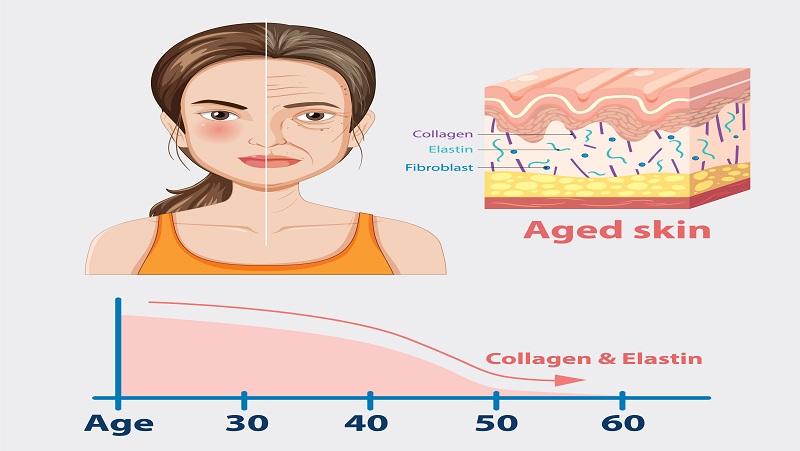Losing weight is a major milestone, and it comes with numerous health benefits. However, weight loss also leads to loose or sagging skin – a common side effect that many people experience. This makes them look old, affecting both their appearance and confidence.
The key reason behind this is the loss of collagen, a naturally occurring protein in the body that keeps skin firm, elastic, and youthful. But when its levels drop (due to aging or rapid weight loss), skin struggles to snap back, which in turn results in that stretched or sagging look.
In this blog, we’ll break down the role of collagen in skin health and how you can naturally boost collagen production to support skin elasticity during your weight loss journey.
What Is Collagen and Why Does It Matter?
Collagen is the most abundant protein in your body. It acts as the glue that holds your skin, muscles, bones, and connective tissues together, keeping everything firm and structured.
Collagen provides the skin with the much-needed elasticity, firmness, and hydration, keeping it moist, firm, and bouncy.
How Weight Loss Affects Skin Elasticity
When you gain weight, your skin stretches to accommodate the added volume. If you’ve been overweight for a long time, your skin’s collagen and elastin fibers may become weak. So, when you lose weight–quickly or in large amounts–your skin may not “snap back” right away.
That’s why it’s important to support your skin from the inside out during your weight loss journey.
7 Natural Ways to Boost Collagen During Weight Loss
1. Eat Collagen-Boosting Foods
Include foods that are rich in nutrients that help in collagen production:
- Vitamin C – found in citrus fruits, bell peppers, strawberries
- Zinc & Copper – found in nuts, seeds, and legumes
- Proline & Glycine – amino acids found in bone broth, eggs, and chicken skin
- Omega-3s – from fatty fish, like salmon, and flaxseeds
2. Hydrate Your Skin Consistently
Collagen works best in a hydrated environment. Drink enough water to improve skin elasticity and flush out toxins that can damage collagen.
3. Incorporate Bone Broth in Your Diet
Bone broth is naturally rich in collagen, gelatin, and amino acids. It supports skin structure. Sip on bone broth regularly to give your skin a natural collagen boost.
4. Strength Train
Practice resistance exercises. It will help you build lean muscle mass and will improve skin tone and firmness by giving your skin a solid foundation.
5. Protect Your Skin from UV Damage
Excessive sun exposure breaks down collagen. Wear sunscreen daily, even during winter months, and even when indoors.
6. Use Collagen-Friendly Skincare
Look for skincare products that contain retinol, peptides, and vitamin C. These ingredients help stimulate collagen production at the skin level.
7. Get Quality Sleep
Sleep is your body’s natural repair mechanism. During deep sleep, your body produces growth hormones that support tissue regeneration, including collagen synthesis.
The Final Words
Weight loss is a journey of transformation—both inside and out. While some changes to your skin are natural and expected during weight loss, supporting collagen production through smart lifestyle habits can help you feel more confident and comfortable in your skin. So give your skin the support it needs so it can reflect all the hard work you’re putting in.
Need help with weight loss and skin health? Our weight loss doctor, a board-certified obesity medicine physician, Dr. Mona Lala, can guide you through a customized weight loss plan that supports your body from the inside out. Contact us today to learn more about our expert weight loss programs.




